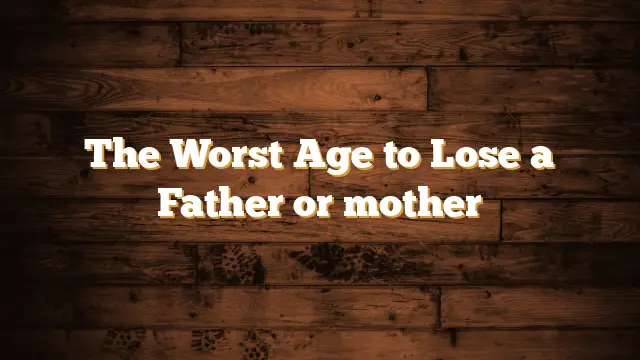Table of Contents
The Worst Age to Lose a Parent
It’s never easy to lose a parent. The worst age to lose a parent is probably the one you were the closest to. Your childhood was filled with a lot of memories. While you may have had your fair share of heartbreak, it’s never easy to move on.
But there are ways to keep your parent close to your heart and deal with their loss. Whether you’re dealing with the grief of losing your parent or the loss of your child, here are some tips to help you move on.
Keeping a parent in your heart
The death of a parent is a devastating experience that changes the lives of many people, transforming the most fundamental aspect of life. Though the death of a parent may seem to be the natural order of things, a person grieving the loss of a parent can also be suffering from secondary losses.
Married friends may drift away from the grieving parent. And even if the parent had been a close friend, he may no longer be the same person.
The loss of a parent can also cause children to lose a sense of self. They might blame themselves for the death, or even feel like they are the cause of the parent’s death. They may also feel aloof and disconnected from their peers and family, and they may begin to distrust others.
They may even feel as though life has no meaning without their parent. It may be a sign of the loss of their identity.
Talking to your parent regularly
It is impossible to know the age of a loved one, and losing a parent can be especially devastating. Losing your second parent is like losing your home, the things you did together, and the habits and rituals you shared with them.
You may even find that the basic way you talk has changed. Instead of referring to your parents in the present tense, you’ll refer to them in the past.
After losing your parents, it is natural to feel a mixture of mixed emotions. Your relief and longing can become intertwined. If your parent died during a special time, your grief will be especially acute because you will be questioned about your own mortality.
However, by talking with your parent regularly, you can avoid feeling that sense of emptiness and regret after their death.
Putting your loss behind you
Putting your loss behind you when losing s parent at worst age can be difficult. During your childhood, you may have looked up to your parent as your moral support and advisor.
As an adult, you may have had wonderful relationships with your parent, and your loss will cause you to miss them deeply. But remember, your parent was a part of you, and they knew you better than anyone else.
Your emotional reactions to the loss are often less predictable, but it is important to address any unfinished business that may be causing you grief. Anger and guilt are both normal reactions to a loss.
In fact, they can even help you cope with the pain of loss. But you should take steps to deal with them as they arise. Work through the emotional baggage that you’ve built up over your lifetime with your parent.
Dealing with your child’s feelings
Often, children experience grief differently than adults do, and it can be difficult to predict when they will feel sad. However, it is crucial to acknowledge your child’s feelings and offer comfort. It is helpful to seek counseling, or join a grief support group if you feel overwhelmed.
While it may be difficult to talk about your loss with your child, it is helpful to talk about your feelings and the death with another adult who is trusted by your child.
While a child may feel angry or depressed for a short time after a parent dies, they may also be relieved that the suffering is over. While it is natural to want to hold on to your child’s memories, it may also be helpful to keep special rituals like scrapbooks or writing journals going.
Remember that children understand the concept of saying goodbye, and it is important to allow them the freedom to do so.


